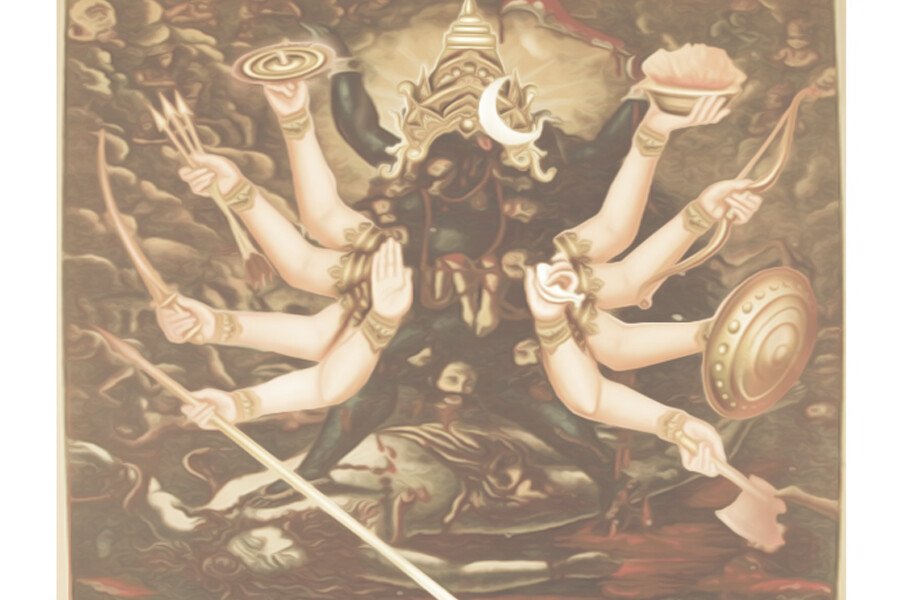The Metaphor of Deepavali
Deepavali, or Diwali as commonly known, will be celebrated on the 12th of November this year. What is the inner, or spiritual, significance of Diwali in Sanatan Dharma? An excerpt from Partho's latest book.

"When the Sanatan Dharma declines, then the nation declines, and if the Sanatan Dharma were capable of perishing, with the Sanatan Dharma it would perish.." Sri Aurobindo
The eradication of Sanatan Dharma? Seriously? Beyond the high-decibel political rhetoric of the worthies who make and support such statements, this, more than anything else, reveals the all-fangs bared nature of the opposition we shall be confronting in the months to come. To counter this kind of attack on Dharma by debate or counter-attack would be similar to snarling back at the beast—perfectly useless and undignified.
The only way we, who wish to stand for Dharma, can resist this kind of onslaught—for make no mistake, what Mr. Stalin Jr. has finally articulated along with the other worthy dignitaries of the so-called ‘‘Sanatana Destruction Conference’’ is but the beginning of a well thought-out campaign of falsehood, adharma, against all that the Dharma stands for—is by confronting lies and distortions with truths. And it shouldn’t at all matter that those who articulate such distortions will not in the least be interested in truths—what matters at this time is the emotionless stating of facts. As Aravind Neelakandan writes, “It is time for those who know what Sanatana Dharma is to launch a comprehensive response, with Hindu Sangathan as the embodiment of Sanatana values.”
Reflect for a moment on what exactly Mr. Stalin Jr. said—“What is Sanatana? Sanatana means nothing should be changed and all are permanent. But the Dravida model calls for change and all should be equal.”Is that so? Sanatan Dharma, if one cares to study its foundational truths even cursorily, regards only the absolute truth, Sat, as permanent, unchanging. All else is impermanent, anityam. Social practices, therefore, whatever be their ultimate value, cannot be regarded as nityam—they are self-evidently subject to change and evolution. No human society or culture, no social or cultural belief or value system, can be static or permanent, they need must be evolutionary and dynamic to remain alive and relevant to deeper human needs. This is what our Dharmic seers have stated repeatedly, trenchantly.
Wherever and whenever social or political systems or beliefs have tended to stagnate or ossify, there have been thinkers and reformers who have risen, individually or collectively, to disturb the status-quo, to question, even challenge, and disrupt. Even a preliminary study of the history of Dharma will bear this out.
And equality? In spite of all the deliberate and often mischievous misreadings and misunderstandings of Manu Smriti and the Vedas, the fact of the matter remains that Sanatan Dharma is unarguably the most egalitarian darshan that humans have evolved over the ages. The first principle of the Sanatan Dharma is oneness of being—ekam Sat, reality is one and indivisible, non-dual. How then can there be even a suggestion of inequality in the Sanatan Dharma? This is not to say that inequality does not exist on the ground, in the day to day reality of Hindu society. Of course it does. And where, pray, does it not? In which religion, society or system does it not exist? Egoism, arrogance, self-interest, insecurity, greed, all leading to otherness, exclusivism and inequality, are characteristics of our essential—and hapless—human condition, whether individual or collective, and it doesn’t matter what religion or politics we follow. But how does any of this mean that Sanatan Dharma is flawed?
If we destroy thousands of human lives by dropping an atom bomb, does that mean nuclear physics is flawed? And do we seriously not know the difference? Or is there a deeper disease of the mind and spirit that compels us, perhaps in spite of ourselves, to express such inanities and falsehoods?
As Shri Annamalai pointed out: “Mughals tried to eradicate Sanatana Dharma, they couldn't do it. East India Company tried, they couldn't do it. The Christian missionaries who only came to southern part of India, specifically to Tirunelveli, to parts of Kanchipuram, Chennai, they tried their best in the late 1800s. They couldn't abolish it…”
Need we say more?
Writer and poet, Partho is an exponent of integral Vedanta, and is a follower of Sri Aurobindo and the Mother. He writes and speaks on Vedanta, Sanatan Dharma and Sri Aurobindo's integral Yoga.
Deepavali, or Diwali as commonly known, will be celebrated on the 12th of November this year. What is the inner, or spiritual, significance of Diwali in Sanatan Dharma? An excerpt from Partho's latest book.
आज की तत्काल आवश्यकता है की आध्यात्मिक एवं बौधिक स्तर पर विकसित लोग सनातन धर्म के लिए खड़े हो, उसकी रक्षा करें और उसके प्रवक्ता और वार्ताकार बनें।
The Age of Sri Aurobindo is here...Excerpted from a talk on Sri Aurobindo and His Relevance in Present-Day India delivered by Dr. Pariksith Singh recently in Jaipur.

